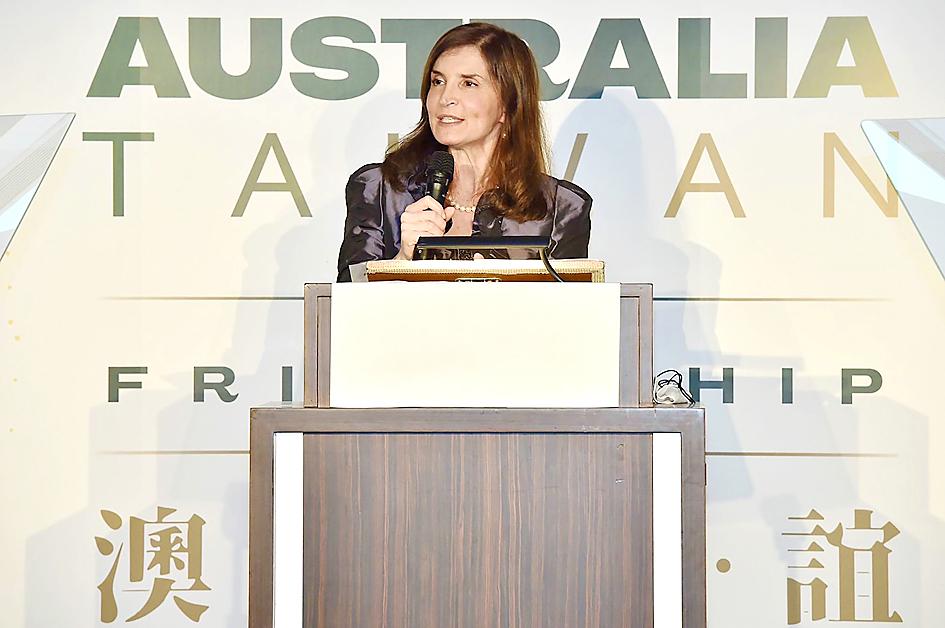The Australian Office in Taipei on Tuesday marked the 40th anniversary of its establishment at a ceremony attended by President Tsai Ing-wen (蔡英文), who pledged to deepen trade and security ties with Canberra.
Under the leadership of Australian Representative to Taiwan Jenny Bloomfield, who took office in February, bilateral relations are expected to become even closer, Tsai said according to a transcript of her speech released by the Presidential Office.
Over the past five years, trade and investment between Taiwan and Australia have grown 10 to 13 percent annually, showing that bilateral relations are strong and mutually beneficial, she said.

Photo courtesy of Australian Office in Taipei via CNA
“I want to take this opportunity to thank everyone across Australia who has come out in support of Taiwan’s inclusion in the CPTPP,” Tsai said, referring to the Comprehensive and Progressive Agreement for Trans-Pacific Partnership.
“By joining this trade bloc and negotiating a bilateral economic cooperation agreement, we can take significant steps forward in our trade relationship,” she added.
Australia is a key partner for Taiwan’s energy transition, with the goal to achieve carbon neutrality by 2050, Tsai said, adding that the two countries would work together toward the Asia-Pacific region’s sustainable development.
“Taiwan and Australia are both committed to upholding security, stability and prosperity in the Indo-Pacific,” Tsai added.
The Australian government this year repeatedly spoke up in support of Taiwan’s international participation, and emphasized the importance of peace and stability in the Taiwan Strait, she said.
“Taiwan remains committed to working with our Australian colleagues to safeguard our region and uphold our shared values of democracy, freedom and the rule of law,” Tsai said.
The Australian office hailed next year as “Australia-Taiwan Friendship Year,” which is to include an arts exchange partnership to support cultural and arts exchanges between young people, with particular focus on members of Aboriginal communities.
The office also launched the “40 Years, 40 Stories” project to showcase personal stories told from Taiwanese and Australian perspectives to demonstrate the breadth and depth of the bilateral relationship.
“Australia is proud to be Taiwan’s second-most popular education destination, and we are working together to promote Taiwan’s Bilingual 2030 goal,” the office said.
Australia is Taiwan’s largest energy provider, and the nations are natural partners in the transition to net-zero carbon emissions through technologies such as hydrogen, the office said, highlighting the importance of strong and reliable supply chains.
The ties also continue to deepen through thriving trade in premium food and agricultural products, development cooperation, and cooperation in international fora, such as APEC, the WTO and the Global Cooperation and Training Framework, which was created by Taiwan and the US, it said.
The ceremony was also attended by Presidential Office Secretary-General David Lee (李大維), Ministry of Foreign Affairs Secretary-General Lily Hsu (徐儷文), Academia Sinica President James Liao (廖俊智), Democratic Progressive Party legislators Chiu Yi-ying (邱議瑩) and Lo Chih-cheng (羅致政), National Culture and Arts Foundation chairwoman Lin Mun-lee (林曼麗) and foreign representatives of other nations, the Presidential Office said.

‘DENIAL DEFENSE’: The US would increase its military presence with uncrewed ships, and submarines, while boosting defense in the Indo-Pacific, a Pete Hegseth memo said The US is reorienting its military strategy to focus primarily on deterring a potential Chinese invasion of Taiwan, a memo signed by US Secretary of Defense Pete Hegseth showed. The memo also called on Taiwan to increase its defense spending. The document, known as the “Interim National Defense Strategic Guidance,” was distributed this month and detailed the national defense plans of US President Donald Trump’s administration, an article in the Washington Post said on Saturday. It outlines how the US can prepare for a potential war with China and defend itself from threats in the “near abroad,” including Greenland and the Panama

The Chinese Nationalist Party (KMT) is maintaining close ties with Beijing, the Democratic Progressive Party (DPP) said yesterday, hours after a new round of Chinese military drills in the Taiwan Strait began. Political parties in a democracy have a responsibility to be loyal to the nation and defend its sovereignty, DPP spokesman Justin Wu (吳崢) told a news conference in Taipei. His comments came hours after Beijing announced via Chinese state media that the Chinese People’s Liberation Army’s Eastern Theater Command was holding large-scale drills simulating a multi-pronged attack on Taiwan. Contrary to the KMT’s claims that it is staunchly anti-communist, KMT Deputy

RESPONSE: The government would investigate incidents of Taiwanese entertainers in China promoting CCP propaganda online in contravention of the law, the source said Taiwanese entertainers living in China who are found to have contravened cross-strait regulations or collaborated with the Chinese Communist Party (CCP) could be subject to fines, a source said on Sunday. Several Taiwanese entertainers have posted on the social media platform Sina Weibo saying that Taiwan “must be returned” to China, and sharing news articles from Chinese state media. In response, the Mainland Affairs Council (MAC) has asked the Ministry of Culture to investigate whether the entertainers had contravened any laws, and asked for them to be questioned upon their return to Taiwan, an official familiar with the matter said. To curb repeated

Myanmar has turned down an offer of assistance from Taiwanese search-and-rescue teams after a magnitude 7.7 earthquake struck the nation on Friday last week, saying other international aid is sufficient, the National Fire Agency said yesterday. More than 1,700 have been killed and 3,400 injured in the quake that struck near the central Myanmar city of Mandalay early on Friday afternoon, followed minutes later by a magnitude 6.7 aftershock. Worldwide, 13 international search-and-rescue teams have been deployed, with another 13 teams mobilizing, the agency said. Taiwan’s search-and-rescue teams were on standby, but have since been told to stand down, as